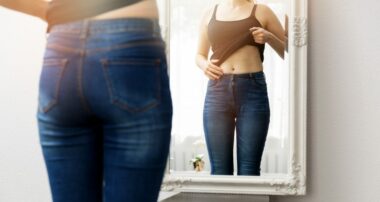Kim Kardashian or Gwen Stefani? Women and Men Disagree on “Perfect” Female Body, How Far to Go to Achieve Ideal Physique
New Survey Finds Men More Demanding Than Women of Themselves, Partners When it Comes to Physical Appearance
Phoenix, Ariz. – March 23, 2018 – Men and women across the U.S. agree that the ideal male body type would be similar to that of soccer superstar David Beckham, according to a January 2018 study conducted for Rosewood Centers for Eating Disorders. But there’s a difference of opinion when it comes to the perfect female body. Women describe their perception of the perfect body as being like singer Gwen Stefani, while men prefer women to have more curves (a la Kim Kardashian), the Rosewood study uncovered.
The new survey, conducted for Rosewood by Ipsos Public Affairs, polled 1,000 Americans over the age of 18 and found that while most men (55%) and women (54%) consider an “athletic physique” to be the perfect male body type, the sexes are divided when it comes to the perfect female body. In fact, nearly half (49%) of women think women with an “athletic physique” reach perfection, while 38% of men say “a woman with curves” is their ideal.
4 out of 5 Men and Women Unhappy With Their Bodies, Survey Says
When thinking about their own appearance, most respondents (79%) admit they are unhappy with how their own body looks at times. This discontent is most common when looking in a mirror (37%), when at the beach in a bathing suit (32%), or when shopping for clothes (31%). How far Americans are willing to go to change their bodies differs by gender, the survey found. Men are three times more likely than women to say they would be willing to exercise to the edge of their physical limit every day, even if they have to endure pain (23% vs. 8%, respectively). Nearly one in 10 (9%) men admit they’d be willing to take performance-enhancing drugs to achieve perfection, compared to only 2% of women.
What’s more, men are more likely to make sacrifices to achieve their ideal body. The survey found that although women are slightly more likely to give up deep fried foods (49% of women vs. 41% of men) or alcohol (45% of women vs. 37% of men) in order to obtain the ‘perfect’ body, men are more likely to give up everyday comforts, such as:
- social media (38% vs. 29% of women)
- their pets (12% vs. 4%)
- their job or career (7% vs. 4%)
- their home (6% vs. 0%)
- a relationship with someone they love (4% vs. 1%)
- financial security (4% vs. 1%)
- their physical or emotional health (3% vs. 0%)
“When men and women start considering ‘whatever it takes’ to reach some unrealistic ideal of the perfect body, you’re getting into a dangerously risky place,” said Dr. Dena Cabrera, executive clinical director for Rosewood Centers for Eating Disorders and co-author of the book, ‘Mom In The Mirror: Body Image, Beauty and Life After Pregnancy.’ “Even with the fairly low percentages of these survey results, it’s unhealthy for anyone to go so far as to push their bodies to the point of pain, abuse performance-enhancing drugs or give up perfectly healthy aspects of their lives in order to achieve a certain body. It’s particularly concerning men are more willing to endure such extremes, given that men are already less likely to seek treatment than women if their behavior extends to an eating disorder.”
Many Men Want Women to Take “Extreme Measures” to Achieve a ‘Perfect Body’
Just as alarming: According to Rosewood’s survey, men are more likely than women to want their partner to take extreme measures in order to achieve the perfect body: exercise to the edge of their physical limits every day regardless of pain (13% of men vs. 5% of women), skip meals (5% vs. 1%), take performance-enhancing drugs (5% vs. 2%), consume laxatives (3% vs. 0%), or throw up after eating (3% vs. 0%).
“Women are already under so much pressure to look as thin as models and actresses or as fit as professional athletes, thanks to Photoshopped images in the media, societal pressure and their own perceptions of what female beauty is,” Cabrera said. “It’s disconcerting to think their male partners could be adding to this pressure by expecting women to endure unhealthy extremes to look a certain way.”
Not only should men and women not engage in the potentially damaging behaviors referenced in Rosewood’s survey, Cabrera concludes, but they should also pay less attention to the bodies of celebrities, which are often manipulated with photo-editing software or achieved through extreme exercise with personal trainers. “Attempting to look like Kim Kardashian or David Beckham is not a realistic goal,” Cabrera said. “Americans’ obsession with looking like celebrities and professional athletes is leading to unhealthy behaviors, and we need to change the perception of beauty before these behaviors progress to conditions such as eating disorders.”
To combat the prevalence of body dissatisfaction in the U.S. and the unhealthy behaviors developing as a result, Cabrera recommends attending a local American National Nutrition Month event, forming healthy habits of regular, moderate exercise and eating well-balanced, nutritious meals. If you suspect you or someone you know may be struggling with an eating disorder, Cabrera recommends getting screened by a qualified health professional. “We can all help change the conversation around body image in the U.S.,” Cabrera said. “And we can all help our loved ones get help if they take their attempts at perfection too far.”











